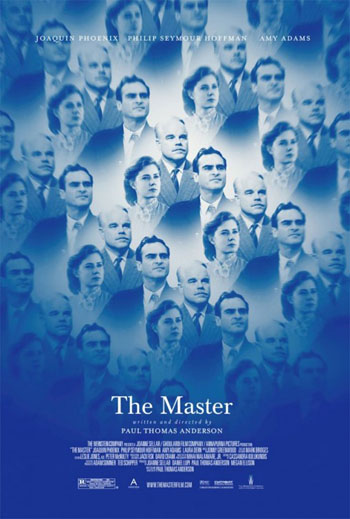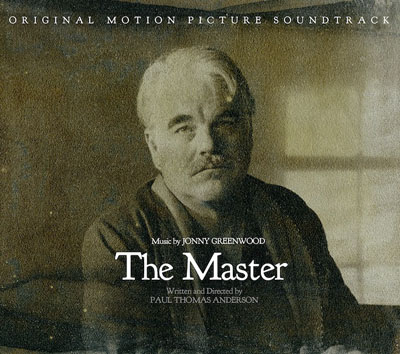Yesterday, we made note of a few initial reactions to Thursday night’s screening of Paul Thomas Anderson’s The Master in Chicago. Today, we’ve got a first round of full-bodied reviews. First, though, a bit of background as to how this screening came about, and we begin with Patrick McGavin at Movieline: “The advent of digital projection has rendered the costly and time consuming format largely obsolete and only a handful of theaters around the country have the proper technological specifications to project such films. The Music Box is one of those theaters, and just as critics petitioned a recalcitrant Fox Searchlight to offer more screenings of Kenneth Lonergan’s second feature Margaret, Time Out Chicago film editor Ben Kenigsberg was instrumental in bringing about the Chicago event after he wrote a series of well-reported blog posts insisting on the need for a screening in Anderson’s preferred 70mm format.”
“This was only the second public screening of The Master; the first was a surprise premiere in Santa Monica.” Time Out‘s A.A. Dowd: “From the film’s first shot of waves crashing in a spectacularly blue ocean, the benefits of 70mm are blindingly obvious. In terms of color and clarity, nothing compares; regardless of what one thought of The Master—a weird, transfixing study in sickness and devotion—there was no denying the retina-tickling pleasures of this enhanced viewing experience.” Echoing many, Dowd finds The Master to be “quite easily the strangest and most esoteric picture Anderson has ever made—and frankly too much to unpack and digest in one viewing.”
For more on 70mm, film preservation, and Martin Scorsese’s Film Foundation, which had a hand in the screening, see Drew Hunt‘s entry for the Chicago Reader, where film editor J.R. Jones focuses on the film itself: “Like [PTA’s There Will Be Blood (2007)], it’s a powerful period piece because, in addition to the flawless locations and production design, it persuasively dramatizes the mind-set of the times—in this case the postwar era, when the self-destructive Freddie Sutton (Joaquin Phoenix) is discharged from navy service in the South Pacific and flounders back in the States before he comes under the wing of L. Ron Hubbard—sorry, make that Lancaster Dodd (Philip Seymour Hoffman). And just as There Will Be Blood chronicled the contest of wills between an older man (Daniel Day Lewis’s greedy and ruthless oil man) and a younger (Paul Dano’s smarmy young star preacher), The Master tracks the emotional struggle between Hubbard—sorry, sorry, Lancaster Dodd—and the troubled, sexually obsessed, and often violent young man as he tries to fit in with the flock that’s already gathered around Dodd. The movie has the feel of something I’ll need to see several more times to really get a handle on, but the genius of the film, I think, is that Freddie’s personal story allows one to think about Scientology in terms of its limits on personal freedom—which includes the freedom to fail miserably at life.”
Ray Pride at Movie City News: “Explanations are pared away; background for ‘The Cause’ that ‘Master’ represents is implied, hardly ever explained. Motivations of secondary characters are elided. There’s hardly a force onscreen beyond Master and Freddy. Amy Adams, as Master’s wife, has three scenes that show her to be yet another sort of master in the emotional equations.”
“It’s not my business to instruct the Weinstein Company how to distribute its movie,” concedes the Tribune‘s Michael Phillips. “But let’s pretend it is my business. Opening this film wide, in conventional projection formats, is a mistake. It’s not The King’s Speech. It’s not The Artist. It’s not half as ‘easy’ as Anderson’s previous film, the inspired There Will Be Blood. Based on last night’s 70mm screening, the question’s inevitable: Why wouldn’t Weinstein go out of its way to treat this exotic bird with care and to maximize interest and availability in experiencing The Master in optimum 70mm circumstances? That’s how he shot it (mostly), and that’s how it should be seen (when and where possible).”
Meantime, you can listen to “Application 45 Version 1” from Jonny Greenwood’s soundtrack at the Film Fatale.
In other news. The House Next Door previews its “20 Most Anticipated Fall Films,” and yes, you can bet that The Master is one of them.
It’s Grégoire Colin Day at DC’s.
DVD/Blu-ray. The New York Times‘ Dave Kehr reviews “a fine new box set,” Universal Rarities: Films of the 1930s, boasting four features: Million Dollar Legs (1932), “a freewheeling, borderline surrealist comedy more or less about the Olympic Games”; Belle of the Nineties (1934), “[Mae] West’s film all the way, although the director, Leo McCarey (The Awful Truth), allows his fine hand to show in a few scenes that allow West to drop her mask and utter some world-weary asides, humanizing her in a way that her other films do not”; Raoul Walsh‘s Artists and Models (1937), “a loosely structured revue comedy with Jack Benny as an agent trying to place his girlfriend (Ida Lupino, at the end of her eye-candy period) in a big advertising campaign”; and Henry Hathaway’s Souls at Sea (1937), which disappoints, “though as always it’s good to have the film back in circulation.”
Reading. The latest entry in Reverse Shot‘s Take Four symposium: Caroline McKenzie on Donald Cammell’s Demon Seed (1977), whose “color choices aid in elucidating the film’s view on humanity’s complicity in its own moral destruction.”
Blogging for the Chicago Reader, Ben Sachs explains why see Tony Gilroy’s The Bourne Legacy has him thinking of Hitchcock’s Topaz (1969).
In the works. Tom Hanks will co-produce the JFK assassination drama Parkland, the directorial debut of reporter and screenwriter Peter Landesman. Graham Fuller has details at Artinfo.
Listening. Via Catherine Grant, here’s Mark Moore, introducing his playlist, “A Night at the Scala (Movie Soundtrack Mixtape)” (88’47”): “Inspired by my teenage nights at The Scala Cinema near Goodge Street where you would end up after the clubs shut. I remember nights coming down from speed unable to take the usual uplifting delights of Pasolini and sipping coffee with Jah Wobble. Watching the mayhem as the Carburton Street Squat rabble came down: Boy George, Marilyn, Steve Strange and Philip Sallon hurling bitchy comments at all the straight boy post-punkers. I saw Throbbing Gristle, 23 Skidoo, Spandau Ballet and Modern Romance play there! I got my movie education there. There’s nothing better than watching Eraserhead or Female Trouble with a packed house full of clubland’s finest dressed up to the nines.” And Scala Beyond, a “six-week nationwide celebration of all forms of cinema exhibition,” begins rolling across the Isles today.
For news and tips throughout the day every day, follow @KeyframeDaily on Twitter and/or the RSS feed. Get Keyframe Daily in your inbox by signing in at fandor.com/daily.





